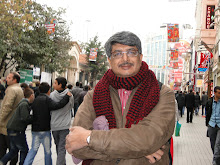We started out with one all-India party and that was the Indian National Congress. The Communist Party of India was probably the next in terms of coverage, prominence and a fair bit of sympathy but no political power so to say.
In the first five Lok Sabhas, Congress was the single dominant party and the others were in low double digits. All other parties were below double figures. Similar pattern follows for the second, thru eighth Lok Sabha except for the sixth Lok Sabha which saw a Janata Party government. This position changed rapidly from 1989 onwards.
This indicated an all round preference for a national party.
This period also saw major reorganization of states on linguistic basis. As mentioned in my earlier post, this created space for large linguistic and culturally homogenous groups to be together. Though done with much reluctance, this eliminated all chances of culture, language and other similar emotive reasons from the political platform. This did not create any drift towards regional political parties.
What then contributed to the rise of regional political outfits and why did they get political legitimacy through the electoral process??
One of the first states to move away from national party system to state level entities was Tamil Nadu and the trigger was “imposition of Hindi”. There were widespread riots against the declaration of Hindi as a sole link language and emotions ran high. There was a speech made in Indian Parliament by C N Annadurai advocating the secession of the four southern states into a separate
Shiv Sena, in Maharashtra, was one of the earliest regional political outfits. They gained tremendous support and prominence fighting for Mumbai to be part of Maharashtra and not
Andhra Pradesh – NTR with his Telgu Desam was essentially born to save the “Telgu pride”. This was the perceived humiliation of Telgu leaders in Congress and discrimination against the state. The result is TDP a powerful regional party where a national party reigned supreme. It now has to share this space with two regional parties in the state. The scales have tilted back in favour of Congress since 2004.
One cannot forget large scale insurgency in Nagaland and Mizoram, essentially Christian majority states whose emotional, cultural and social integration in the Indian main stream has never happened. Whilst these two states live an uneasy peace, Manipur is on the boil now.
The latest headache now confronting many state governments is the armed rebellion by Naxalites.
What we have is a multi-linguistic, multi-cultural, multi-religious social structure coming together for the first time in a political union. This diverse structure is made more complex by a rigid caste system, deep prejudices, wide spread backwardness, lack of healthcare, education, opportunity and so on.
In such a milieu, what was needed was a fair and inclusive governance and emphasis on rapid development.
When one analyses each of these state crises, it is easy to discern
- a sense of callousness and high handedness,
- inability to empathise with local needs and sentiments,
- a political process that is arbitrary, favouring certain groups to the exclusion of all others,
- perpetuating deep rooted economic and social inequalities,
- perception of favaouritism / appeasement towards certain groups (favourite whipping boy of regional parties)
- attempts to initiate hegemony of thoughts, culture and language,
- government machinery perceived as brutal, biased and openly unfair,
- Existence of corruption at every level in society and the administrative set-up.
Against, this backdrop when you have a powerful voice addressing a limited regional group and promising fairness, equality of opportunity or opportunity for locals, resources for development, access to basics of life, value for minerals / raw materials, becomes an instant hero. These regional outfits gain prominence and legitimacy in eventual course. Over a period of time, these groups become political powerhouses.
What we see today is a very fragmented social structure and a fractured political class is only a reflection of the society it seeks to represent.
Post elections scenario
This post was written before the elections and the current wisdom might make this problem small. I earnestly hope this is so but the problems shall not disappear unless the root causes are attacked.
The open unashamed wrangling for seats should have given rise to immense revulsion but I see the gigantic state machinery involved in making the problem less severe than it really is.
There are many serious gaps in Centre – State relations and at the state level the problems are more severe. It will not be wise to say that regional parties have been shown their place. Infact, Elections – 2009 has shown many of them increase their vote share. The quirky nature of electoral arithmetic however, has ensured that they have lost seats.
Far-sighted thinkers and seasoned political figures from both major political groupings should seize this opportunity and, work towards expansion and consolidation of national political parties.




